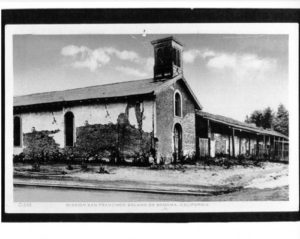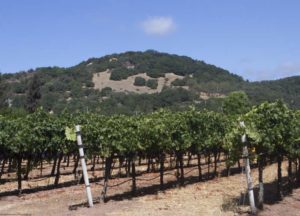Solomon Schocken
Values Codes I – E – L
Solomon Schocken was born in 1842 in Rosasen, in Prussian-occupied Poland.
Little is known about his life in Europe, but he was described as “short (and) redheaded.”
Along the way…
Solomon Schocken arrived in New York in 1862, and soon thereafter migrated West.
He jumped ship while working as a baker on a German vessel headed for San Francisco, and began selling goods to Northern California miners, including some in Napa County.
In 1864, Schocken sailed to Honolulu, where he spent three years at a restaurant – first as a waiter and then as the owner.
By 1867, he was back in Napa County working at a general store in Monticello.
He became a naturalized citizen in Napa County in 1871, and married Austrian-born Dora Baer a short while later.
Sonoma
Solomon Schocken holds the distinction of being Sonoma’s first known Jewish settler.
He arrived in Sonoma in the fall of 1873 and opened a general store in the Toscano Hotel.
Schocken ran afoul of the town’s religious and economic norms, as recounted by Henry Cerruti, a frequent visiter to Sonoma in the 1870’s:
Being a sharp businessman, [Schocken] soon obtained the greater part of the trade of Sonoma, greatly to the discomfort of the other merchants, who with an envious eye watched the growing popularity of the diminutive Jew and his coquettish wife. On several occasions they tried to undersell him, but to no purpose – Schocken always stood his ground. Finding at last that they could not compete with him in a business way, they unearthed the law which requires stores to be kept closed on Sunday.
Officials demanded that he close his store on the Sabbath, but did not indicate which day – Saturday or Sunday. He decided to close the store on Saturday, the Jewish Sabbath, and open it on Sunday, for which he was promptly arrested.
According to Cerruti:
He pleaded as an excuse that he kept the Sabbath as prescribed by his religion. Those words had hardly been uttered when the Justice of the Peace howled: “Damn you, do you wish to transplant Jerusalem to Sonoma? Mr. Clerk, please collect a fine of twenty-five dollars from the prisoner, and if he be ever again brought before me on a charge of this kind he shall be sent to prison.”
Schocken nevertheless established himself as a successful store owner, purchasing the Barracks and surrounding land from Gerenal Mariano and Benicia Vallejo in 1878 for $2,500.
He opened S. Schocken, General Merchandise in 1879 and continued the business until his retirement in 1910. The store carried large volumes of goods at low prices, including groceries, tobacco, feed, kerosene, and wine.
In 1881, Schocken purchased the Mission San Francisco de Solano from the Catholic Church for $3,000 in gold coin. He used the converted chapel as a hay and goods warehouse for twenty years, before selling it to the California Landmarks League in 1903.
In the late 1880’s, Schocken acquired the 69.5-acre Schocken Hill (formerly Battery Hill) for $2,250. He purchased an additional 7.5 acres for $375 in 1892.
The Schocken Hill quarry, which quarried basalt blocks, employed numerous Italian and Swiss immigrants. The blocks were used as pavement stones in Petaluma, San Francisco, and San Jose.
According to the California State Mining Bureau Bulletin of 1906, Schocken’s venture was “the largest quarry being operated in the vicinity of Sonoma … About ten men are at work getting out gutter rock and paving blocks, and they average about 10,000 blocks a month.”
In 1909, the quarry business was failing. While horses were adept at traversing San Francisco’s steep cobblestoned roadways, cars were less capable. With the demand for stone pavement declining sharply, Schocken shrewdly sold the quarry to the Natomas Consolidated Company “at a cost of many thousands of dollars.” (Sonoma Index-Tribune, Oct. 9, 1909)
Schocken retired in 1910 due to ill health. Between 1910 and 1932, he rented space in the Barracks store to different merchants, grocers, and local clubs.
Beginning in the mid-1920s, Schocken most of his time in San Francisco, where he lived with his second wife, Clara. He owned a house in the city, as well as some two-dozen pieces of real estate.
Civic
Solomon Schocken was a lifelong Republican. In September 1883, he was elected to the Sonoma Board of Trustees, the precursor to today’s City Council.
He lost an 1884 re-election bid, but regained his seat in 1892 for a four-year term.
Fraternal
Schocken was initiated into the Masonic Lodge in 1880.
Family
Solomon had no children. He and Dora divorced in 1893, after 20 years of marriage.
Solomon married Clara Handel, a widow and German native, in 1897.
Solomon Schocken died in San Francisco in 1932, and was interred at the Hills of Eternity cemetery in Colma, California.
“Upright and square in all his business dealings, Mr. Schocken has made a host of friends in this valley who will remember him always as the fairest merchant Sonoma has ever had.”
– Sonoma Index-Tribune, June 3, 1910
Neal Ross Attinson is curator of this Solomon Schocken exhibit. Visit his blog: The Metaphorager


